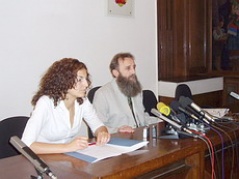National Assembly of the Republic of Serbia / Activities / Activity details

Friday, 9 July 2004
Local elections to be held on 12 or 19 September
The Chairman of the National Assembly of the Republic of Serbia, Predrag Markovic, held a press conference to announce the date for calling local elections.
The Chairman of the National Assembly of the Republic of Serbia, Predrag Markovic, held a press conference to announce the date for calling local elections.
The current Local Elections Act was passed by the National Assembly of the Republic of Serbia on 13 June 2002. According to the Act, councilpersons are elected according to the proportional system, with a 3% census, while municipal council chairpersons and city mayors are elected according to the majority “first-past-the-post” system. Elections must be called at least 30 and at most 60 days before the date set for their holding.
The last general local elections were held on 24 September 2000. Since the passage of the current Local Elections Act, elections under its provisions were held in 14 municipalities. Mr Markovic will, according to legislation, call local elections for councilpersons, council chairpersons and mayors in all municipalities where elections were held on 24 September 2000; elections will also be held in other municipalities where conditions have been met.
Mr Markovic will call the elections on Sunday 1 August, while all electoral activities are scheduled to begin on Monday 2 August.
The press conference also saw Mr Markovic give a report on the results of a three-month campaign aimed at combating inter-ethnic incidents and provocations.
At a meeting of the Chairman of the National Assembly of the Republic of Serbia with representatives of 10 Ethnic Minority Councils (those of Ukrainian, Slovak, Ruthenian, Bulgarian, Backa Croat, Romanian, Roma, Bosnian, Hungarian and Croat ethnic minorities), held on 14 April 2004, attended by the Committee on Inter-ethnic Relations of the National Assembly of Serbia, it was established that two types of issue had been solved. The first issue was that of a lack of financial resources for the functioning of the Councils, while the second involved a lack of staff charged with communicating and co-operating with the Councils. Both problems were consequences of the fact that the Councils had been formed in accordance with legislation at the State Union level, while the issues relevant to their work and functioning had to be solved at the level of the Republic of Serbia.
The most pressing issues were successfully solved in less than a month. After obtaining precise information on financial needs, the Ministry of Finance granted the Councils a sum of 41,400,000 dinars, which exceeded that mentioned in their requests.
In accordance with recommendations made by the Assembly Chairman, the Ministry of Finance, the Ministry of Education, the Ministry of Labour and Employment and the Ministry of Culture established permanent contacts with the Councils.
The Assembly Chairman charged the Committee on Inter-ethnic Relations with preparing a report on inter-ethnic incidents and provocations on the territory of the Autonomous Province of Vojvodina.
In his capacity as Acting President of Serbia and Chairman of the National Assembly, Mr Markovic officially requested the Minister of the Interior and the Republic Public Prosecutor, as well as heads of districts, police chiefs and chairpersons of municipal councils in Vojvodina which had seen incidents, to report on their details and measures taken so far and strategies for preventing possible future incidents. Aiming at getting a clear picture of the situation in the field, Mr Markovic visited a number of municipalities (Kikinda, Zrenjanin, Becej, Backi Petrovac, Novi Sad, Subotica etc) and talked with representatives of Vojvodina municipalities, as well as with members of the public. Mr Markovic also discussed all measures taken with the Speaker of the Hungarian Parliament, Ms Katalin Szili, as well as with representatives of the international community.
The Office of the Chairperson also notes that the reports fit together. From 1 January to 31 May, there took place a total of 294 events that could be, in the broadest sense, taken to have hallmarks of inter-ethnic incidents. A total of 132 criminal offences were perpetrated, of which 61 were solved through police work. All the offences were perpetrated by individuals. Their destructive actions had been instigated by unseemly statements of certain political leaders, as well as unbecoming newspaper articles. Detailed reports will be forwarded to the appropriate Assembly committee.
It was also noted that the appropriate bodies have taken all possible measures to solve these cases. The strictest condemnation and punishment of such incidents is necessary; however, the only way they can be prevented and eradicated completely is by democratising society as a whole, which requires the combined efforts of all constructive political, media and non-governmental organisations and individuals.

